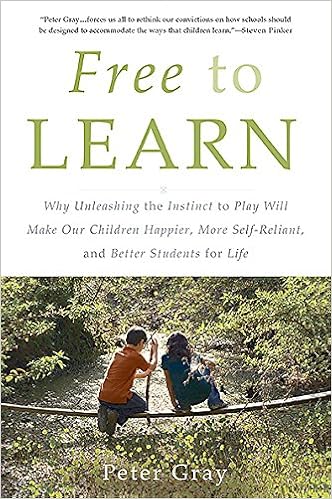Free to Learn by Peter Gray
Chapter 2 - The Play-Filled Lives of Hunter-Gatherer Children
The hunter-gatherers had three core values. Autonomy--every person (even a child) was free to make his own choices as long as his choices did not infringe upon another person's freedom or violate a societal taboo. Sharing--each person had a duty to share what he had (skills, possessions) with others as needed and to cooperate in obtaining food and defending the group. Equality--everyone's needs were equally important and no one was superior/inferior to another.
In this society, adults practiced what Gray calls "trustful parenting." They believed that children's instincts could be trusted, and children were allowed to follow their own way to learn what they needed to learn. Children explored freely and spent their time playing. And most of this play mimicked adults' actions. Children were allowed to use adult tools (knives, axes) since they needed to play with these things to gain skills in using them. Adults also created scaled down versions of other tools (bows and arrows, baskets) for children to use. If children asked about how to do something, adults showed them how to do it. Adults helped when asked but otherwise left children to explore as they chose. Adults were resources for the children's education but children were in control and directed their own learning.
Adults believed that children would begin to contribute to the group when they were mature and skilled enough to do so. Children played until they were ready to be a part of adulthood. Children played at hunting and developed skills in tracking and making tools. They learned about animals' movements and habits. They learned about plants and how to process them for eating. Children would play in mixed age groups, with younger children learning from the experience of older ones. Mixed age play is more nurturing and less competitive.
"Hunter-gatherers seem to accept the twists and turns of fate and make the best of them, rather than complain." This culture has a greater capacity for self-control. Some research has indicated that play (self-directed play) is essential in helping the brain develop ways to control fear and anger in stressful situations. Perhaps the play of hunter-gatherer children contributed to the development of greater self-control in their adults.
Peter Gray thinks that today's societies could learn from the hunter-gatherer culture and bring some of their ways of education into today. (In fact, I think Peter Gray idealizes that older culture.) And I can see his point. I have seen the way that children mimic adults when they are engaged in pretend play. I see their desire to use real tools and to try out different roles. I have seen kids give freely of their own knowledge (or watch what someone with more experience does so they can learn).
I think a little more "trustful" approach to education would be helpful for children today. I think we should release the need to dictate what they should learn and how they should learn it. Of course, that means giving up some control. (Always tricky with us adults) And stopping all the assessment and grading. (I'd gladly see that go.) It particularly resonated with me when I read that adults were resources for education but allowed children to choose their own learning.
I'll be interested to see how this plays out through the book. After all, our culture is a little more complicated than the hunter-gatherers.



